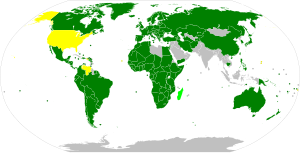
Back الاتفاقية الخاصة بوضع اللاجئين Arabic Qaçqınların Statusuna dair BMT Konvensiyası Azerbaijani Konvencija o statusu izbjeglica BS Convenció de 28 de juliol de 1951 relativa a l'estatut dels refugiats Catalan پەیماننامەی پەیوەندیدار بە ڕەوشی ئاوارەکان CKB Úmluva o právním postavení uprchlíků Czech Flygtningekonventionen Danish Abkommen über die Rechtsstellung der Flüchtlinge German Σύμβαση για το καθεστώς των προσφύγων Greek Convensiòun in sim'a 'l status ed rifugê EML
 | |
| Signed | 28 July 1951 |
|---|---|
| Location | Geneva, Switzerland |
| Effective | 22 April 1954 |
| Signatories | 145 |
| Parties | |
| Depositary | Secretary-General of the United Nations |
| Full text | |
The Convention Relating to the Status of Refugees, also known as the 1951 Refugee Convention or the Geneva Convention of 28 July 1951 is a United Nations multilateral treaty that defines who a refugee is and sets out the rights of individuals who are granted asylum and the responsibilities of nations that grant asylum. The convention also sets out which people do not qualify as refugees, such as war criminals. The convention also provides for some visa-free travel for holders of refugee travel documents issued under the convention.
This convention was enshrined in Article 78 of the Treaty on the Functioning of the European Union.[2]
The Refugee Convention builds on Article 14 of the 1948 Universal Declaration of Human Rights, which recognizes the right of persons to seek asylum from persecution in other countries. A refugee may enjoy rights and benefits in a state in addition to those provided for in the convention.[3]
The rights created by the Convention generally still stand today. Some have argued that the complex nature of 21st century refugee relationships calls for a new treaty that recognizes the evolving nature of the nation-state, economic migrants, population displacement, environmental migrants, and modern warfare.[4] Nevertheless, ideas like the principle of non-refoulement (non-returning of refugees to dangerous countries) (Article 33) are still applied today, with the 1951 Convention being the source of such rights.[5]
- ^ a b Cite error: The named reference
convratwas invoked but never defined (see the help page). - ^ "Consolidated Version of the Treaty on the Functioning of the European Union". Official Journal of the European Union. 26 October 2012. Retrieved 6 June 2023.
- ^ Convention relating to the Status of Refugees, Article 5.
- ^ Schoenholtz, Andrew I. (2015). "The New Refugees and the Old Treaty: Persecutors and Persecuted in the Twenty-First Century". Chicago Journal of International Law. 16 (1). SSRN 2617336. Retrieved 6 June 2023.
- ^ Cite error: The named reference
jaeger01was invoked but never defined (see the help page).